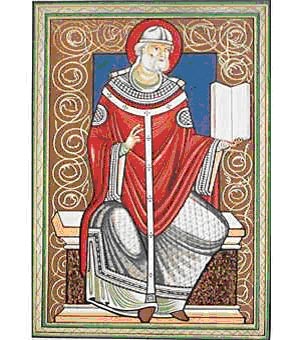Pope St. Gregory I , better known in English as Gregory the Great, was pope from 3 September 591 until his death. Gregory is well-known for his writings, which were more prolific than those of any of his predecessors as pope.

He is also known as Gregory the Dialogist in Eastern Orthodoxy because of his Dialogues. For this reason, English translations of Orthodox texts will sometimes list him as “Gregory Dialogus”. He was the first of the popes to come from a monastic background. Gregory is a Doctor of the Church and one of the six Latin Fathers. He is considered a saint in the Roman Catholic Church and the Eastern Orthodox Church.
Immediately after his death, Gregory was canonized by popular acclaim. John Calvin admired Gregory and declared in his Institutes, that Gregory was the last good pope. He is the patron saint of musicians, singers, students, and teachers.

Writings
- Sermons (forty on the Gospels are recognized as authentic, twenty-two on Ezekiel, two on the Song of Songs)
- Dialogues, a collection of miracles, signs, wonders, and healings including the popular life of Saint Benedict
- Commentary on Job, frequently known even in English-language histories by its Latin title, Magna Moralia
- The Rule for Pastors, in which he contrasted the role of bishops as pastors of their flock with their position as nobles of the church: the definitive statement of the nature of the episcopal office
- Copies of some 854 letters have survived, out of an unknown original number recorded in Gregory’s time in a register. It is known to have existed in the Vatican, its last known location, in the 9th century. It consisted of 14 papyrus rolls, now missing. Copies of letters had begun to be made, the largest batch of 686 by order of Adrian I. The majority of the copies, dating from the 10th to the 15th century, are stored in the Vatican Library.
Opinions of the writings of Gregory vary. “His character strikes us as an ambiguous and enigmatic one,” Cantor observed. “On the one hand he was an able and determined administrator, a skilled and clever diplomat, a leader of the greatest sophistication and vision; but on the other hand, he appears in his writings as a superstitious and credulous monk, hostile to learning, crudely limited as a theologian, and excessively devoted to saints, miracles, and relics.
Prayer of Gregory the Great
O Lord, You received affronts without number from Your blasphemers, yet each day You free captive souls from the grip of the ancient enemy. You did not avert Your face from the spittle of perfidy, yet You wash souls in saving waters. You accepted Your scourging without murmur, yet through your meditation You deliver us from endless chastisements. You endured ill-treatment of all kinds, yet You want to give us a share in the choirs of angels in glory everlasting. You did not refuse to be crowned with thorns, yet You save us from the wounds of sin. In your thirst You accepted the bitterness of gall, yet You prepare Yourself to fill us with eternal delights. You kept silence under the derisive homage rendered You by Your executioners, yet You petition the Father for us although You are his equal in Divinity. You came to taste death, yet You were the Life and had come to bring it to the dead. Amen.
